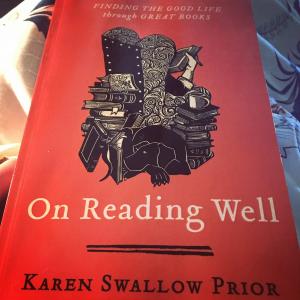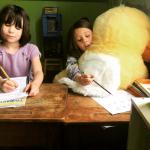I don’t know if you knew, but there was yet another royal wedding this last week. On Friday, Princess Eugenie married Jack Brooksbank and I stood around in the church kitchen for more than an hour watching people in hats buffeted by high winds as they arrived and took their seats in Saint George’s chapel. Finally the bride also arrived and then I had to go do something real. So it was only much later that I spent myself, nor counted the cost, fruitlessly trying to see bits of the service. I came away disappointed having only listened to some loud commentary about the dress and the scar, and a passing remark that the reading was not from the Bible but was from The Great Gatsby. I found a seconds long clip of the preacher talking about why Eugenie loved that particular book so much—because it reminded her of her new elegant husband—and I will have to spend several more hours this afternoon trying to see the whole thing.
What’s so interesting, though, is that I just finished Karen Swallow Prior’s On Reading Well, and I couldn’t have imagined a more iconic and tragic illustration of the failure to read rightly—to grasp the truth of whatever it is that you are reading. If you set out to get it wrong, reading The Great Gatsby as your wedding text seems a perfect way to do it. And if you don’t know why that is, you should go out and read On Reading Well.
There were three things I loved about the book. And don’t worry, I know it’s Sunday, so I won’t neglect to tell you to go to church, and even more so, why being able to read is so essential to enjoying yourself when you get there.
First, if such a thing is possible, On Reading Well got better as I went along. In lots of books, old and new, the best chapters are usually in the beginning, to catch you and keep you, and then, when you’ve really committed yourself, the ones toward the end fall into repeating what’s already been said, or are not expressed as well, or in other wise indicate that everyone got tired and had other things to do. Not always, of course, but more often that I would like, especially with non-fiction. In this case, the good wine was kept for last. My favorite two chapters were right at the end, and I came away stricken to the heart, and convicted about my own cowardly hardness of heart toward all my fellow men.
Second, I thoroughly enjoyed reading about books I hope never to have to read. I do love to read, but I am not a Great Reader, avoiding, whenever I possibly can, books that will disturb and traumatize me. I don’t want to read Silence, for example, nor see the movie, because it will take me a long time to climb out of the misery of those people’s lives. Nor also the book from the chapter I liked best. But I loved reading about those books, and the principle holds—whatever you’re reading, you should read it with an interior bent towards wisdom, towards seeing past yourself into the true realities that hold and shape a universe of meaning.
Which brings me to my third point. It is so vital to learn how to read properly, and virtuously, not missing the point, but also not trying to fit a book into a flattened moralistic worldview, because ultimately, you want to be able to read the Bible well. And that happens to be the single book where everyone comes all to bits, trying and failing to make sense of what it is for and what it is trying to say. If you read The Great Gatsby and thought it would be a lovely wedding text, or Tom Sawyer and thought it was really racist, or The Pilgrim’s Progress and thought it was a literal how to manual—but then we could go a step further and poke at what many Christians say about some books, like The Lord of the Rings is bad because it is so full of magic, or Shakespeare is bad because he wasn’t even a Christian—what sort of ridiculous things are going to happen to you as you approach such a strange and terrible book as God’s own holy word? You are not going to understand what it is about. You are not going to be able to make it through the difficult passages. Or worse, you are going to try to shove it into various boxes that make it manageable and essentially useless.
The thrilling thing about a book, and especially the Bible, is that it is one of the best ways to be swept up out of yourself and see, through the eyes of other people, what goodness and virtue are meant to be. And that is the essence of On Reading Well. If you haven’t been able to step out into a book—a troubling book—and come back out on the other side a slightly different person, your moral imagination, the core virtues that should be the shape and furniture of your interior life, just won’t be there.
Ancient people knew this—and, to some degree, I think Christians know it, which is why there is so much anxiety about reading the wrong kinds of books. But the modern person has largely forgotten it. It is easier to make a bald, plain statement about how all people should be—Be Virtuous shouts so many memes on Facebook, and so many threads on Twitter. Stop Being Bad. Be Good Instead. You scroll along and the go away to carry on being bad. But that’s not even how God formed and shaped his own people. When you face down the Bible, you are looking at the literature, the poetry of a God who relishes the perfectly turned image, the beautiful turn of phrase, a story so grand it takes thousands of years to unfold. The more you read it, the more you’re changed, the more your mind and heart incline towards what is truly beautiful and right.
But you have to know how to read, and how to read well. So go to church, but when you go home, collapse back on your couch with a book, and take seriously the deep wisdom of the virtues so richly painted in On Reading Well.













